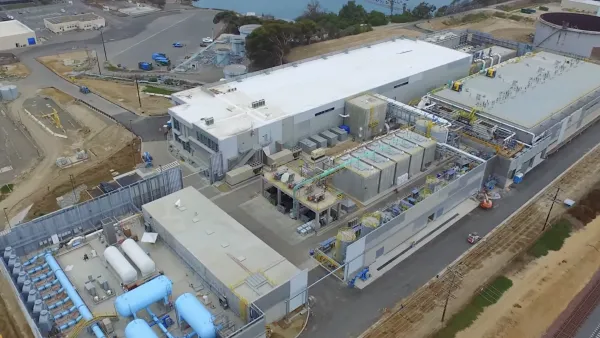Allegations of conspiracy and bullying haunt access to water in the arid, Mediterranean climate of San Diego, Adam Nagourney and Felicity Barringer report.
Home to two of the nation's largest cities, Southern California is precariously dependent on that most precious of natural resources, water. With roughly 10 to 20 inches of rainfall per year at best, the region is fed largely by the Colorado River, thanks to a herculean feat of political maneuvering at the turn of the last century.
But the consortium of local governments and water districts that manages Southern California's access to water is under fire from the San Diego County Water Authority after a move this month to hike rates by 7.5 percent this year and the next – which, after considerable backlash, was reduced to 5 percent.
San Diego officials have taken the Metropolitan Water District of Southern California (MWD, for short) to court over complaints that the region was discriminated against in secret meetings, going so far as to publish compromising documents and emails on a new website.
Jeffrey Kightlinger, general manager of MWD, rejects the allegations, calling them "unprofessional" and "a disservice to the public."
Nagourney and Barringer elaborate on San Diego's position in the region, explaining that the county "has four seats on the district's 37-member board, and there is little incentive for other communities to entertain San Diego's argument: When San Diego pays less, everyone else pays more."
Some in San Diego are skeptical of the Water Authority's course of action. "It just doesn't feel right," said Lani Lutar, the president of the San Diego County Taxpayers Association. "They are already pursuing the lawsuit. Those are ratepayer dollars being spent and all of the advertising. Is that necessary? The lawsuit is going to resolve the matter. The P.R. stunt has taken it too far."
FULL STORY: Fees and Anger Rise in California Water War

National Parks Layoffs Will Cause Communities to Lose Billions
Thousands of essential park workers were laid off this week, just before the busy spring break season.

Retro-silient?: America’s First “Eco-burb,” The Woodlands Turns 50
A master-planned community north of Houston offers lessons on green infrastructure and resilient design, but falls short of its founder’s lofty affordability and walkability goals.

Delivering for America Plan Will Downgrade Mail Service in at Least 49.5 Percent of Zip Codes
Republican and Democrat lawmakers criticize the plan for its disproportionate negative impact on rural communities.

Test News Post 1
This is a summary

Test News Headline 46
Test for the image on the front page.

Balancing Bombs and Butterflies: How the National Guard Protects a Rare Species
The National Guard at Fort Indiantown Gap uses GIS technology and land management strategies to balance military training with conservation efforts, ensuring the survival of the rare eastern regal fritillary butterfly.
Urban Design for Planners 1: Software Tools
This six-course series explores essential urban design concepts using open source software and equips planners with the tools they need to participate fully in the urban design process.
Planning for Universal Design
Learn the tools for implementing Universal Design in planning regulations.
EMC Planning Group, Inc.
Planetizen
Planetizen
Mpact (formerly Rail~Volution)
Great Falls Development Authority, Inc.
HUDs Office of Policy Development and Research
NYU Wagner Graduate School of Public Service




























